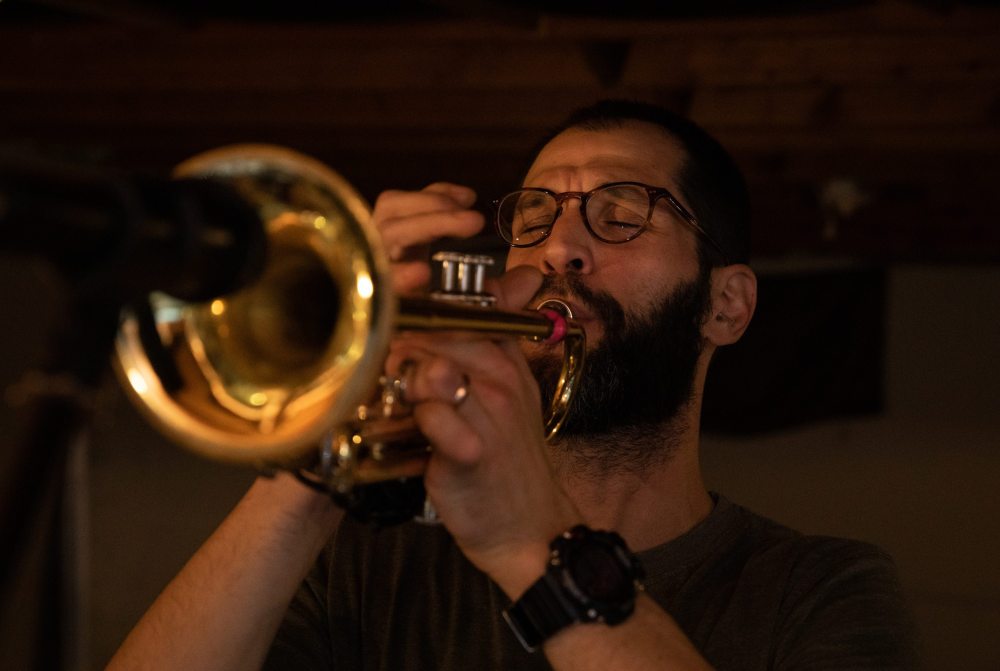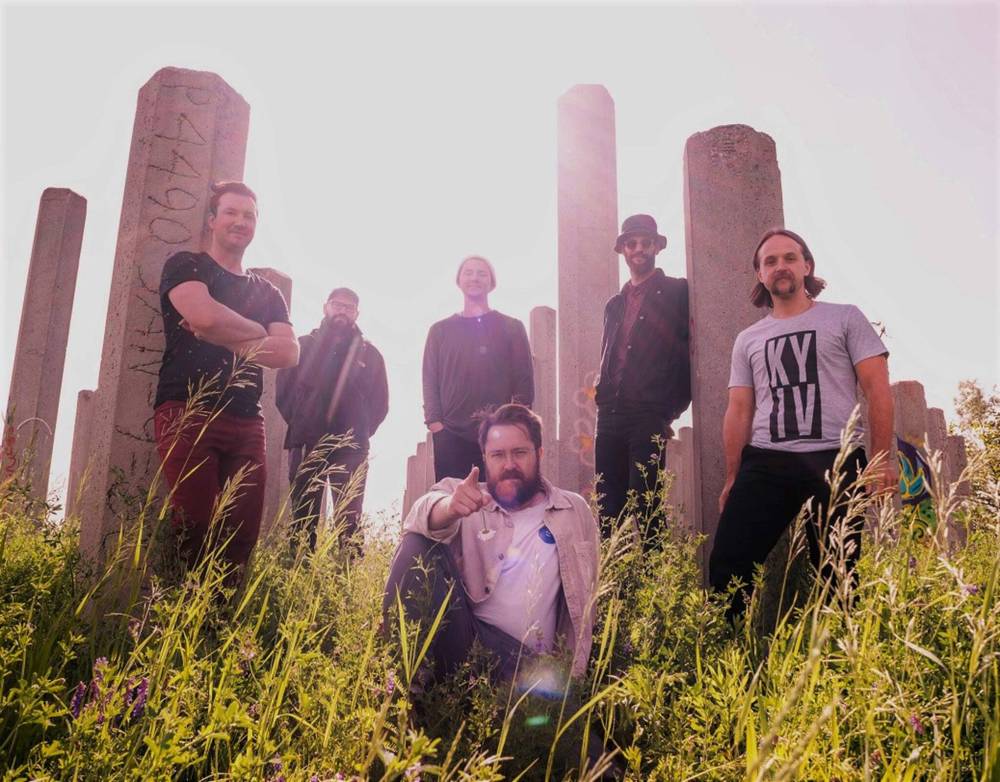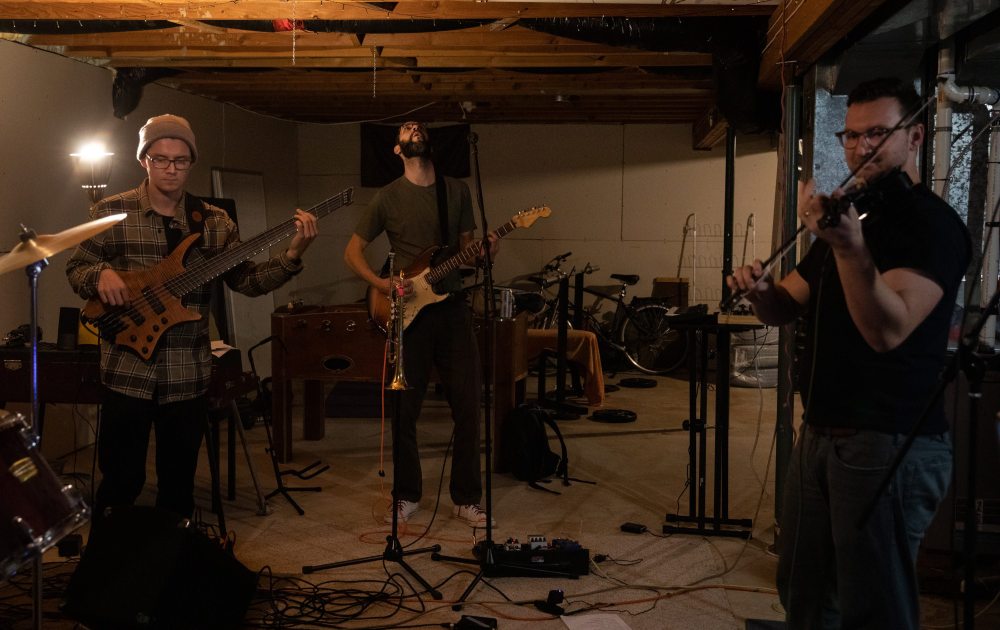Soundtrack to the resistance Ukrainian artists are using music to come to grips with life in wartime
Read this article for free:
or
Already have an account? Log in here »
To continue reading, please subscribe:
Monthly Digital Subscription
$0 for the first 4 weeks*
- Enjoy unlimited reading on winnipegfreepress.com
- Read the E-Edition, our digital replica newspaper
- Access News Break, our award-winning app
- Play interactive puzzles
*No charge for 4 weeks then price increases to the regular rate of $19.00 plus GST every four weeks. Offer available to new and qualified returning subscribers only. Cancel any time.
Monthly Digital Subscription
$4.75/week*
- Enjoy unlimited reading on winnipegfreepress.com
- Read the E-Edition, our digital replica newspaper
- Access News Break, our award-winning app
- Play interactive puzzles
*Billed as $19 plus GST every four weeks. Cancel any time.
To continue reading, please subscribe:
Add Free Press access to your Brandon Sun subscription for only an additional
$1 for the first 4 weeks*
*Your next subscription payment will increase by $1.00 and you will be charged $16.99 plus GST for four weeks. After four weeks, your payment will increase to $23.99 plus GST every four weeks.
Read unlimited articles for free today:
or
Already have an account? Log in here »
Hey there, time traveller!
This article was published 24/11/2022 (1116 days ago), so information in it may no longer be current.
On a bitterly cold night in early November, as darkness fell over Winnipeg’s streets, a long line of people shuffled down an Exchange District sidewalk, huddled against whips of thick snow. As they inched forward their voices caught the wind to reveal a notable distinction: for every one person speaking English, about three were speaking Ukrainian.
That night was for them, for the newcomers. It was the last stop of Ukrainian hip-hop troupe Kalush Orchestra’s first North American tour, and in Winnipeg, as with every other performance, displaced Ukrainians packed the venue. They wore flags draped over their shoulders. They danced as their tears flowed, and for a few hours, they felt a little closer to home.
The timing of the tour was no coincidence. It, too, was an artifact of war, bringing the performers to where their fans had fled all over the world. Other Ukrainian music stars are set for similar jaunts this winter. But the tour was also a sign of Kalush’s rising global fame: just two days after the cosy Winnipeg show, they headlined the spectacular MTV Europe Awards.
In a way, Kalush’s arc tells a story about all that has happened; their career will always be tied to the war. In the first months of the invasion, their hit single Stefania was a fixture at Ukrainian solidarity rallies and in TikTok videos cheering Ukraine; in May, the tune won the 2022 Eurovision Song Contest, buoyed by a record-smashing surge of viewer votes.
Stefania was not originally a war song. A tribute to Kalush MC Oleh Psiuk’s mother, it had been selected as Ukraine’s Eurovision entry on Feb. 22, two days before the invasion. But in the desperate weeks that followed, as millions of people spilled over Ukraine’s borders and dispersed across the world, they took the song with them.
So while the tune’s timing couldn’t have been imagined, let alone intended, it also couldn’t have landed at a moment when it was more needed. Kalush’s peculiar alchemy, which blends hip-hop rhymes with traditional telenka flute and other Ukrainian folk inspirations, is palatable to global pop music audiences; it’s also unmistakably, and inescapably, Ukrainian.
In other words, the song was undeniably a bop. And at a time when most of the world, which hadn’t given much thought to Ukraine prior to Feb. 24, was finding it on a map and figuring out why Russia had invaded, Stefania invited them to come meet a people that have been eager to explore who they are, where they’ve been, and what they’re becoming.
Kalush aren’t the only voices in that cultural vanguard. In the last nine months, Ukraine’s music charts have overflowed with songs from every possible genre, exploring every emotion that arises from war, resistance and disruption. In some songs, the influence of ancient folk styles is overt, in others far more subtle; only rarely is it entirely absent.
MELISSA MARTIN / WINNIPEG FREE PRESS Ukrainian hip-hop troupe Kalush Orchestra performs for a packed crowd, largely made up of newcomers, at Winnipeg’s Exchange Event Centre on Nov. 10.
Resilience lives in those tunes. Some are crushingly sad, others snarling with anger. Many are viciously funny, which seems a signature of the Ukrainian spirit: pop star Masha Kondratenko’s smash hit Vanka-vstanka would be indistinguishable from any other sugary teen dance fare, were it not for the lyrics urging Russian soldiers to bring their own body bags.
So the war is a travesty, a staggering insult to life and dignity. But the music? The music of the war has been incredible.
In Winnipeg, Andriy Michalchyshyn has noticed that too. The frontman of longtime local Ukrainian folk-rock-fusion-punk-whatever-you-wanna-call-it band Zrada, he wasn’t at the Kalush show earlier this month, though he does admire the group: “Kalush kicks ass,” he says. “When you listen to their music, there’s so much going on there contextually.”
And like anyone who’s tuned in to the music of Ukraine, he’s seen how it has shaped, and been shaped by, the war.
That process started early. On just the third day of the war, rock star and Boombox frontman Andriy Khlyvnyuk, who had rushed home from an American tour to sign up to defend the country, released a short TikTok video of himself in uniform, carrying a rifle, singing the old patriotic folksong Oi u luzi chervona kalyna in the heart of Kyiv.
The clip, which was quickly remixed into several wildly popular, dance-floor-friendly versions, became such a rallying cry in Ukraine that for youthful generations, Khlyvnyuk’s rock-inflected interpretation has become the dominant one, supplanting the traditional melody.
When kids in newly liberated Kherson sang it this month, they sang Khlyvnyuk’s rendition.
“The community’s talking to itself with the music,” Michalchyshyn says, chatting one night at an Osborne Village pub. “It’s one of the things that it’s doing, also with art, with writing. Musicians are learning lessons from each other, and things are being bounced around the community in this really interesting, psychic way.”
So here’s a question: what is the role of diaspora bands, like Zrada, in contributing to that dialogue? Winnipeg fans can find out for themselves Friday night: on the heels of a riotously emotional Winnipeg Folk Fest debut this summer, the band is set to headline the West End Cultural Centre. (For those intrigued, there are still tickets left for $25 at EventBrite.ca.)

The gig will be a blast, Michalchyshyn promises. It’ll be a party. It’ll be the group’s last show together before a long hiatus — two of the six bandmates are leaving for other projects, and the remaining four will take some time to reimagine — and they will be debuting a new song, What Will Be, which is both about, and not really about, the war.
“I think a lot of our songs are thinking songs, they’re questioning songs,” Michalchyshyn says. “What will be? It’s a metaphor about what’s going to happen next. Maybe that means after this turbulent time in Ukraine’s history. Or maybe it’s a question about what happens to anyone who loves this country, or feels loyalty, or kinship. What happens to you then?”
That’s a question Michalchyshyn and his bandmates have been negotiating themselves since Feb. 24. Although they are far away from the fighting, it’s changed them too.
Before the full-scale invasion, he says, Zrada had long leaned away from “the uber-Ukraine stuff,” such as the flag; when fans yelled “Slava Ukraini” at their shows, he felt uncomfortable.
“All of a sudden, it took our band out of being a band that played music in a different language, into ‘Now you’re a Ukrainian band,’” he says. “I don’t think we ever wanted to be called a ‘Ukrainian band.’ I don’t think we are. We’re a band, we sing our songs in Ukrainian. For me it was kind of, ‘Right, you’ve narrowed it all to this one thing now.’”
“I think a lot of our songs are thinking songs, they’re questioning songs… What will be? It’s a metaphor about what’s going to happen next.”–Andriy Michalchyshyn, Zrada
So if they sang in Ukrainian and drew from Ukrainian folk traditions and mythology and culture, he says, it was “simply to get the language and music out there to other people, to hear how beautiful it could be.” But he’d never held a flag onstage, he says, or wanted to, until he did it this summer at folk fest. But in that moment, when he did, it felt great.
“Obviously, things have changed since February for us,” he says. “Now, all bets are off. It’s all different.”
That’s the thing about a war. It doesn’t leave much room for grey. And to everyone who is touched by it in some way, it asks them to consider a pretty fundamental question: who are we? To some, the answer comes easy, but to a band like Zrada, it’s always been a salient question.
In the past, articles about the band tended to present them as the “bad boys of Ukrainian music,” Michalchyshyn says. That wasn’t what they were aiming for — “we just wanted to make cool psychedelic folk music” — but mostly, the trope hinged on a misconception: that Ukrainian music hadn’t evolved from what the first immigrants brought with them.
There was a time, perhaps, when Michalchyshyn thought that too. Growing up in Manitoba, speaking Ukrainian at home and being shuttled between various Ukrainian cultural lessons, he was surrounded by a specific iteration of what being Ukrainian means; one that, like most diasporas, is focused on preserving links to the past, and what makes them distinct.
JENN KOSTESKY PHOTO
That can be a lot, for a kid. Some embrace it, some reject it, and some — like Michalchyshyn — lurch in between.
“Through no fault of their own, there’s a weight that gets placed on you,” he says. “‘You must maintain this thing. You can’t break the chain. You have to do the Sunday school, you have to do the camps.’ And yes, you have a lot of fun, despite your best efforts sometimes… but I remember times I just wished, ‘Oh my god, could I just not be this, for a while?’”
Music, though, would offer a different way of being Ukrainian. As a teen in the 1990s, Michalchyshyn gravitated towards the heavy bands of the West — Anthrax, Metallica, that kind of thing — but he was deeply curious about what was coming out of Ukraine, especially in the ways it differed from how he’d learned his own culture.
It was more difficult for music to cross oceans, back then. Mostly, it travelled with people. Relatives would come back from Ukraine, bearing records they’d plucked off shelves at random; somewhere in their house, Michalchyshyn says, his parents still have piles of cassettes of highly varying quality. It was an adventure to dive into them every day.

“You’d get this weird music, like ‘What is this stuff?’” he says, with a laugh.
That’s how he discovered the sea change that was happening in Ukrainian contemporary music. It’s how he found hutsul punk and the R&B fusion of Soviet-era icons Braty Hadiukiny; it’s how he found genre-bending Haydamaky, born in Kyiv clubs after Ukraine’s 1991 independence, with whom Zrada was later thrilled to share stages at North American gigs.
“It fused things that I previously thought were worlds apart,” he says. “The first time we heard (Haydamaky), it’s like the Pogues, it’s like the Ramones, it’s like Burning Spear. It’s like all of that, with Ukrainian folk melodies, and it’s incredible.
“They for me fused the music I loved. Punk, metal and then Ukrainian folk music which I grew up on… which was concerts, grandparents, recitals, (dance instructors) making you leap, that kind of stuff. I realized, you can combine these two things. That’s what I’ve always been inspired by.”
“Punk, metal and then Ukrainian folk music which I grew up on… which was concerts, grandparents, recitals, (dance instructors) making you leap, that kind of stuff. I realized, you can combine these two things. That’s what I’ve always been inspired by.”–Andriy Michalchyshyn
Here, there is something that unifies, something poetic: the journey that Michalchyshyn and his bandmates went through wasn’t just a diaspora experience. In Ukraine, artists that had grown up in the Soviet Union were doing the same, just in a mirror image, fusing the western music they’d savoured from bootleg tapes with their grandparents’ village songs.
So that conversation, it went both ways. The hunger to seize an agency in identity that drove Zrada in Winnipeg is the same that would inspire modern Ukrainian acts from Ruslana to Kalush and, now, DJ remixes of rifle-toting rock stars belting out patriotic folk songs. In this light, Zrada aren’t the bad boys of Ukrainian music at all: they’re just what it’s always been.
No wonder, then, that they’ve reconciled the trickier questions about their place at the intersection of culture and politics since Feb. 24. The war has given Ukrainian musicians all over a key in communicating who they are, to themselves and to others: in March, Zrada played a benefit show at the Park Theatre alongside a more traditional choir.
That gig was “therapy for us,” Michalchyshyn says, after weeks of breaking down into tears every day.

And in July, they collaborated with Saint Javelin, a clothing company founded by Canadian journalist Christian Borys that’s raised millions of dollars for Ukraine with its puckishly defiant merch. The collab included a new song, Javelin Jump, and a T-shirt designed by Zrada drummer Nick Luchak that features the brand’s mascot stomping on Putin’s head.
That tune is a fun one, Michalchyshyn says. He just yells in it. It’ll get the crowd going at the show today for sure.
“It’s joy and anger,” he says. “It’s serious, in the way that a mosh pit is serious. But is it? You can get seriously hurt in a mosh pit, which I have. But you’re in there of your own free choice, because it’s a visceral, fun experience. I think our shows are like that. We want people to be dancing. We want people to be happy. We want them to be emotional.
“You have to have the joy. If you wake up every day and read the news, you’ll think that the world is burning. And I don’t believe the world is burning. Parts of the world are burning, but I refuse to every day just be angry. There’s gotta be joy. Is joy defiance? Is joy self-preservation? Take it for what it is.”
melissa.martin@winnipegfreepress.com
Our newsroom depends on a growing audience of readers to power our journalism. If you are not a paid reader, please consider becoming a subscriber.
Our newsroom depends on its audience of readers to power our journalism. Thank you for your support.








